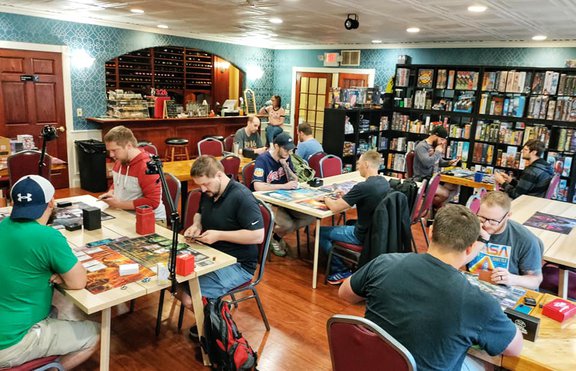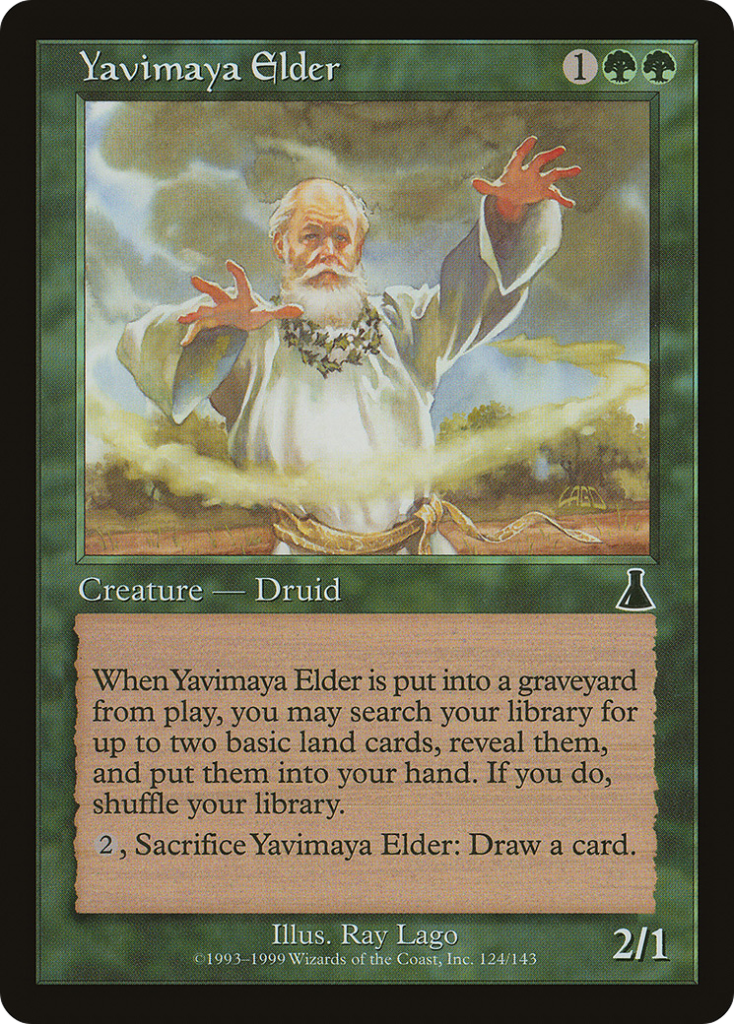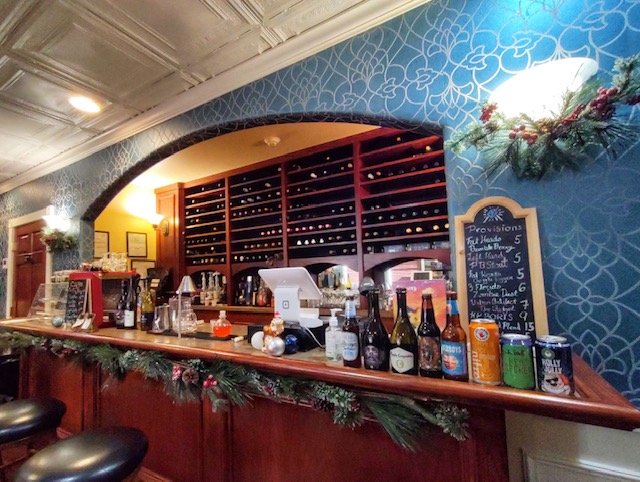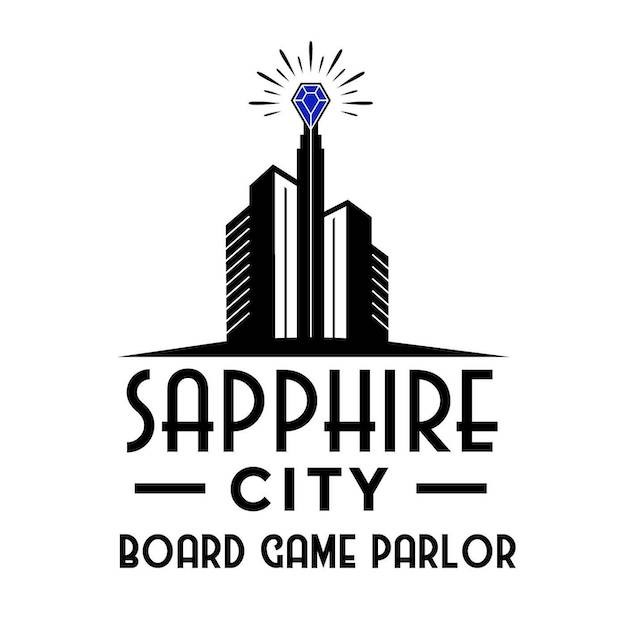In the wake of Magic 30, there was much written and recorded about the way players and the local game stores were treated. Some of the talk boiled down to a version of: players and LGS’s are where the gaming community, specifically, the Magic community lives and breathes. I saw this as a fertile space to start interviewing store owners about their experiences running a game store in these weird (political, economic, cultural, infectious) times, how Magic plays a part in it, and how games in general are faring.
I’d moved to northeast Ohio in the fall of 2018, and one of the first places I sought out ended up being a board game parlor a few blocks from my house. Sapphire City had appeared above a local restaurant at exactly the right time as I arrived in town. James Parsons, the owner, was behind the bar when I visited for the first time. I was seeking out a new Dungeons & Dragons group to join. I’d started role-playing games while in Pittsburgh and desperately needed to continue my imaginative fix. Parsons’s set up is different from the traditional game store. Sapphire City is a gaming parlor. A main bright tall room has a retro feel to it with fin de cicle decorative wallpaper and a tin ceiling. Two opposing walls are lined with a comprehensive library of board games and card games. One side to play, the other to purchase. In between are long oaky tables for gameplay. It’s a cozy, inviting space. Behind a classic wooden bar top is a selection of wine, a small espresso machine, and a rotating craft beer selection. Finally, a wonderful arrangement of homemade baked goods made by his wife, Jessica.

While my D&D campaign took the adventure out of the parlor to someone’s house, I kept wanting to take my wife there for a date. Life got in the way, we had a second child, and then COVID-19 hit. I’d been following Sapphire City on social media and was always delighted to see they were around on the other side of the pandemic. When I started playing Magic this year, I found a Commander pod which meets there on the weekends. It’s been a bright spot in all the trouble. Much of it is owing to James Parsons’s warm personality and community-oriented demeanor. He recently held a Pauper EDH tournament and is planning a casual potluck for parlor regulars who are on the Sapphire Discord, where we conducted this interview.
Kyle: Tell me about how you came to want to run a game store, and how you actually bought it/started it.
James: Game stores were kind of a “third place” spaces for geekdom when I was growing up, particularly during the mid-late 90s during the TCG boom where every other week a new game was coming out to try. I kind of aged out of these spaces as I got older, and started hanging out less in them and just making my purchases and leaving. The more recent trend towards board game cafes caught my interest, and seemed a really good fit for the kind of space I would like – sort of the next step into a more “grown up” space.
I was friends with the owner of the restaurant below our space, and had been thinking of trying to start something that sort of blended a traditional board game shop with a board game cafe. Dipping a toe into each side. He showed me the space, and while it’s off the beaten path it had a speakeasy vibe I really dug, so I snagged it. He’s since moved on, but every restaurant to take up the space below us so far has let us stay, so here we remain.

Knowing that COVID was a major hit to game stores across the country, how did you find ways to hang on and carry through? Was there anything, you feel, that was unique to Sapphire City or the area around Canton, Ohio that kept you afloat? How did the community of players at Sapphire help with that?
We had a handful of tricks to keep making a little money – we obviously have a retail angle as well as the paid playspace, so we allowed people to make appointments to shop and browse. During the holiday season we expanded our retail to take up our seating as well. We would occasionally do “date night” packages, which involved renting a game alongside a bottle of wine. Our community was very receptive to our ideas, and we rented many games during COVID.
Which games were most popular for rent?
Wingspan and Everdell were probably the two most popular games we rented during COVID. A handful of heavier games as well – it was a good time to thumb through a rulebook when you’re cooped up with nothing else to do. But Wingspan and Everdell were consistently the most popular.
But all of this was mainly to have the business keep itself afloat, we still had to let our only two employees go after the first four or five months, and if I hadn’t had additional work in non-gaming areas we honestly probably would have called it quits. Unfortunately, I don’t have much business insight into thriving during COVID as a business, other than to not have all your eggs in that business – which I admit is a very privileged answer to give.
What’s your history with Magic? What set did you start with? Did playing at your local game store inspire you to ever want to work in/run one?
I first started playing Magic: The Gathering sometime slightly after Fifth Edition, maybe Tempest? I was just buying packs here and there when I was 9 or 10 years old, but I definitely have some Tempest cards, so I suspect it was around there when I started buying more often. Early on, I mostly played decks my friends already had, but around Urza’s Saga and onward I started playing more often, and building decks for myself. I have a soft spot for red/green, a Yavimaya-esque deck was the first I took on as a pet project. I had a lot of good experiences playing at local stores in North Texas, we had a lot of them, and it definitely sparked my love of card games and gaming generally. I’m sure some part of that also fed into the desire to have a gaming-related space of my own.

Outside of COVID, what have been some of the struggles and successes of running a local game store?
Our largest struggle is also the one that makes us a bit unique among gaming spaces – acquiring our beer/wine license. When I acquired the space I didn’t realize it was a dry precinct, which didn’t make serving alcohol impossible, but a much longer and more expensive process. That was our largest struggle by a mile.

Otherwise, it’s the standard thing of generating interest, figuring out the “tone” you want your establishment to have, that kind of thing. Admittedly, we’re a weird space–we sell stuff, but not as much as a fully dedicated store. We have beer and wine, but no hard liquor or as much as a dedicated bar. We also try to have a slightly nicer feel than traditional gaming spaces, which comes with a trend towards a slightly older crowd. I think we’ve mostly been successful in setting that tone, the people that we consider regulars appear to appreciate the space and the vibe.
How much does Magic: The Gathering play a part in running a game store? That is: does Magic or card games in general play a major part of the business?
Magic doesn’t play as key a role for us as it might some traditional card shops, but it’s definitely a welcome addition to what we offer. We had Magic products on sale for a while, but it took some time to find our target audience–professional adults playing at a casual level. We didn’t necessarily have an interest in cultivating traditional Friday Night Magic experiences or a Standard-legal tournament crowd. It just doesn’t fit the space, or our focus. But, with time, we found a casual adult crowd just as interested in laughs and the social experience of gaming over wins and prestige.
It’s no surprise to you, I’m sure, that the go-to format for your place is Commander. Do you think that’s expected because it’s “the most popular format” and a “casual format” or because the environment cultivates it?
I think it’s probably a little from both columns. It’s the most popular format by far; I think you’d be hard pressed to find a place that supports Magic that doesn’t at least have a few Commander players. But, it’s also a format that promotes the experience of playing over notching wins. Which isn’t to criticize competitive play–there’s nothing wrong with playing standard meta; I’ve done it and enjoyed it. Our space is more of a beer and pretzels atmosphere, though, and I think Commander leans into that better.
Outside of Magic, what have been some games that you’ve been excited to see get more attention or in-store play? What’s one that you feel doesn’t, but should?
We occasionally have events for board games specifically, we had a Wingspan Tournament right before COVID that Stonemaier Games supplied prize support for. We also hope to have a Blood on the Clocktower event sometime, which is a game that can play dozens of people at once.
I do have a weakness for card games though, and have my ear to the ground for new ones pretty frequently. We’ve supported everything from Android: Netrunner to locally-made Argent Saga, to snagging Flesh and Blood from the start. In the coming year I’m curious to try (and if they are good, support) the upcoming Disney TCG Lorcana, and the physical version of a digital CCG called Shadowverse. One game I don’t feel gets enough attention is Netrunner, but I’m biased and feel it’s one of the best card games ever made. There’s a fan made organization continuing to release content ever since Fantasy Flight Games lost the license. Usually “fan made content” gets a shrug from players, but it’s a sophisticated organization that thousands of players worldwide regard as an authority now. They are de facto the game designers at this point, and I’d love to have a local scene. But, it’s a hard sell.
Also add Summoner Wars to that list. It’s one of the highest rated head-to-head strategy card games, non-collectable (i.e. affordable), and is locally made, but has no local following. That should get more attention, too.
Why do you think Netrunner is a hard sell?
Netrunner originally was a living card game, which is a Fantasy Flight Games system where you have access to every card in the game by purchasing a $15 pack a month. It was the most popular of the living card games, but even when it was alive, all the living card games struggled for in-store support–it’s difficult for a gaming establishment focused on moving product to heavily promote a game that only requires a $15 a month expense.
Now that it’s dead though, even that small incentive is gone. There’s just no product for a shop to stock. Spaces like ours could at least capitalize on supporting a meta by making up the difference in alcohol or coffee beverages from supportive players, but once the license was lost, popularity dwindled significantly.
The first might also be the problem Summoner Wars suffers. There are really, really good two-player strategy card games out there that capture the tactical essence of a Magic-like experience without the card chase, but there’s no reason for shops to push these experiences over single and booster box sales.
To clarify–none of that is meant to rail against Magic too strongly. I love the magic of cracking packs just as much as anyone, it would just be nice for a popular secondary option to gain traction that’s less aggressive on players’ wallets, and spaces that support gaming without necessarily relying on product sales are probably the only places that can happen.

For those who are absolutely clueless about running a game parlor/LGS, what are a few inside baseball facts customers should keep in mind?
I’d tell them to keep in mind that it’s a business first. If anyone wants to open a game shop, or parlor, or board game bar, or card shop, because they just want to participate in the activities they are promoting, just go somewhere that does those things instead. You will not suddenly be doing more of these things just because you have an establishment that supports them–more often than not you’ll be busy.
That came off negative, so here’s a positive as well–if you can derive happiness from watching people play games, have fun, make memories and have laughs as much as you get from participating in those activities yourself, it can definitely be a rewarding experience.
Kyle Winkler (he/him) is a teacher and fiction writer. While he was pre-teen when Magic: The Gathering was released, he didn’t start playing until recently. He’s the author of the cosmic horror novella (The Nothing That Is), a collection of short stories (OH PAIN), and a novel (Boris Says the Words). He’s trying to make Obzedat, Ghost Council work as the commander for his most recent deck.

